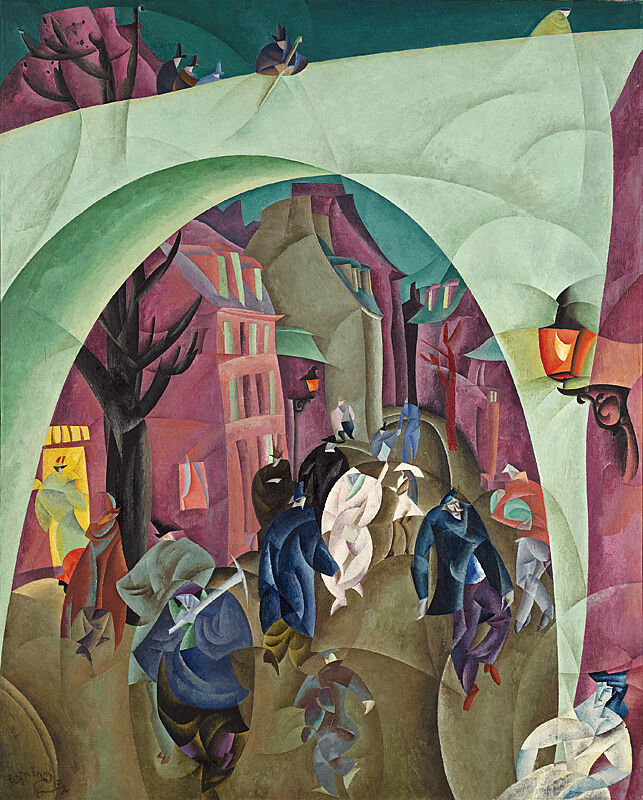End Games
by G. Murphy Donovan (May 2021)

The Green Bridge II, Lyonel Feininger, 1916
My choice early in life was either to be a piano player in a whorehouse or a politician. And to tell the truth, there’s hardly any difference. —Harry Truman
There are several avenues to genuine institutional change. Evolution, reform, war, and revolution immediately come to mind.
All things evolve, for good or ill, over time. Left to its own devices, evolution might be a true neutral.
Short of a catastrophe, political reform of any institution is usually so glacial that purpose is often lost to process. Great Britain is an example of an institutional empire lost in slow motion. Given the vagaries of perennial politicians, a democratic election is often just a bell tolling for the latest reforms.
The US presidential election of 2020 is probative.
War has its merits, if you win. World War II surely produced a new world and an industrial and economic tailwind that still lifts American fortunes today. Korea, Vietnam, and 50 years of Muslim wars, not so much. America hasn’t learned much from war since MacArthur took the Japanese surrender on the fantail of the USS Missouri. Still, defeat for some is often a salutary, if not expensive, change in fortunes. Germany and Japan speak to the merits of kinetic schooling. The clean slate of defeat is often road and destination. Rock bottom is a dead end, then a one-way street. Often, the only way out is up.
 Revolution is often the most unpredictable and drastic agent of change. With revolt, oft times the solution becomes the problem. Revolutionary outcomes are frequently at odds with intent. French, Russian, and Chinese national revolutions speak to post-revolutionary horrors. Nevertheless, all three countries revel in their revolutionary/civil war origins today.
Revolution is often the most unpredictable and drastic agent of change. With revolt, oft times the solution becomes the problem. Revolutionary outcomes are frequently at odds with intent. French, Russian, and Chinese national revolutions speak to post-revolutionary horrors. Nevertheless, all three countries revel in their revolutionary/civil war origins today.
America was born of such fire too, but you might never know it.
Americans seldom speak of “war” today, revolution, or their martial heritage; often ignoring biology, reality, and history in the same breath. America is a product of revolution – and a civil war legacy that lingers still.
Reality and history are often seen now through a recidivist’s prism. If small wars, coups, regime changes, and “insurgencies” count; Uncle Sam is surely a repeat offender. Truth is, at some level, America has been at war, somewhere, for the better part of a century. Contemporary, indeed professional, war is a grim gray business, like porn and drugs; dicey habits we would rather not discuss at dinner.
War and preparedness are draped in the flags of patriotism, “defense” or national security – ours and theirs. Alas, American weapons take pride of place in arsenals around the world. Two Global wars put America on a permanent war footing. When commerce and strategy met at the merge, world-view became a vista of self-fulfilling insurgent prophesies.
Small wars for Americans, if nothing else, is good business. Permanent enemies are now both necessary and sufficient American national Intelligence lodestones. Readiness has replaced success as an objective. Victory is off the table at war college seminars and on the battlefield today for obvious reasons. Small wars are profitable sustainable businesses; global, general, or nuclear war, not so much.
You could argue that three assets gave America the edge for victory in WW II; Russians, science, and Intelligence. Indeed, Russians took most of the casualties in Europe whilst the allies took most of the bows. Two atomic bombs helped bring the war in the Pacific to an abbreviated end, thanks to science. Throughout, in both theaters, British and American Intelligence were literally reading German and Japanese coded mail, providing an enormous tactical and operational advantage. WW II elites became the “greatest generation” by virtue of alliance, science, and objective Intelligence.
We no longer have the Russians, the science, or exclusive intelligence. Intelligence is the biggest national security deficit today. Uncle Sam is now, like Tiresias, flying blind in a naked lady’s body.
 One of the most prescient leaders after WW II was an artillery captain who had earned his spurs at the Meuse Argonne offensive early in the 20th Century. Harry Truman may have been the last great American Democrat; the rare politician who put national interests ahead of personal and party politics. Back in the day when Democrat Party bigots were called “Dixiecrats,” Truman desegregated public facilities and the military by fiat, alienating his party and a good part of the country. For our purposes, Truman’s role in the origins of modern Intelligence is even more profound.
One of the most prescient leaders after WW II was an artillery captain who had earned his spurs at the Meuse Argonne offensive early in the 20th Century. Harry Truman may have been the last great American Democrat; the rare politician who put national interests ahead of personal and party politics. Back in the day when Democrat Party bigots were called “Dixiecrats,” Truman desegregated public facilities and the military by fiat, alienating his party and a good part of the country. For our purposes, Truman’s role in the origins of modern Intelligence is even more profound.
With reservations, the Truman administration created a nascent national security state with the National Security Act of 1948. With one stroke, William “Wild Bill” Donovan’s gaggle of talented amateurs at the Office of Strategic Services was cashiered and a new agency, CIA, was created, employing many veteran WW II agents and analysts. The national security state originated, ironically, under the halo of allied victory. By 1948, The Soviet Union and Russians had morphed from ally into enemy.
The rest is now a necessary fiction we still call the Cold War.
Truman was a humble man of character, a product of middle America. He believed that national Intelligence should be an analytical, not operational, national asset. That paradigm was turned on its head almost immediately by the Dulles brothers establishing a rogue, yea unaccountable, cowboy ethos at CIA that has littered the global landscape with no fewer than two dozen coup or attempted coup victims; starting with Italy and Indonesia and moving subsequently to Africa, Southeast Asia, Latin America, Cuba, Iran, and most recently Afghanistan, Yugoslavia, Libya, and Ukraine.
Afghanistan began as a black operation at CIA which is about to end, like Vietnam, as just another American black eye. The great irony in South Asia is that the putative Muslim allies like the mujahadeen have morphed into nightmares like the Taliban, al Qaeda, and ISIS. Nobody expects the Intelligence Community or DOD to win these pyrrhic fights anymore, all begun in the name of “national security.”
In Persia, a clueless CIA, enabled a Persian ally to morph into a theocracy, a religious terror state. Iran is about to become the world’s first nuclear Islamic fascist theocracy. Afghanistan, and probably Pakistan, is about to travel a similar path. Forty years of body bags and national treasure is now forfeit to reality, the reality of strategic fails like Kosovo, Bosnia, Libya, Iraq, Syria, and now Afghanistan.
Defeat is not confined to the Muslim world. Fails in Europe make comparisons to the demise of old Soviet empire inevitable. Such analogies miss the point, however. In the transition from Soviet Union to Russian Federation, Moscow never lost control of its national security establishment. There are no counterparts today, in Russia, China, or Muslim theocracies to independent and rouge agencies like the American CIA, FBI, or NSA.
America is now burdened with a strategic vulnerability that does not plague putative competitors or enemies in Russia, China, or the Muslim world. Unaccountability in the American national security community is a trojan horse, a genuine internal enemy. The next National Intelligence Estimate about internal subversion might cover the Proud Boys or Oath Keepers and ignore treachery at the FBI and CIA since 2016. The real threat from marginal internal activists, right and left, is that they are useful idiots, a distraction and an excuse for partisan federal apparatchiks to change the subject.
Truman sounded the alarm about a rogue deep state, a cry that was seconded by John Kennedy after the Bay of Pigs fiasco, another CIA black eye. Subsequently, fig leaves like the Church Commission and the 9/11 Commission rationalized warning failures and operational incompetence alike. The director of NSA was actually promoted after 9/11. Every flag officer promoted to the E Ring for the last five decades has had a hand in the Vietnam, Iraq, Afghanistan and War on Terror fiascos.
Failure is now some kind of national strategic norm. Harry Truman used to have a sign in the Oval Office that read “the buck stops here.” Today that sign might read, “the buck, what buck?”
__________________________________
G. Murphy Donovan writes about the politics of national security
Follow NER on Twitter @NERIconoclast